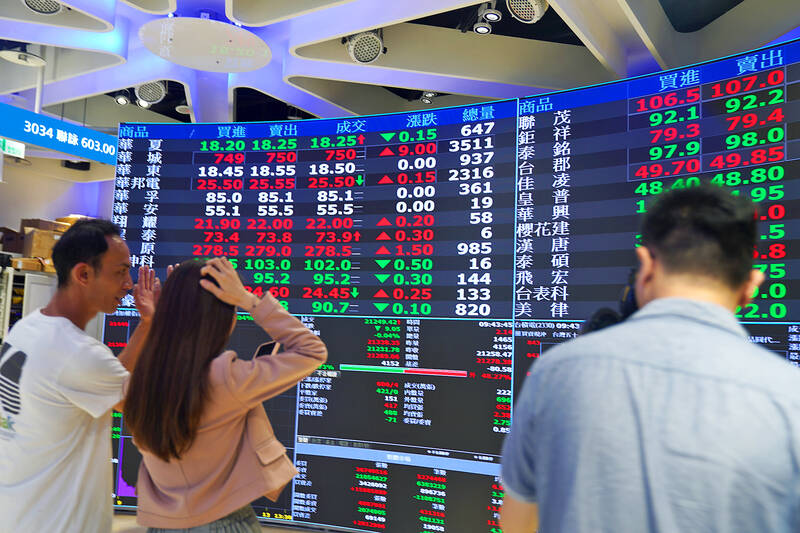The public’s confidence in the economic outlook and stock investment declined slightly this month, but remained positive overall, a survey by Cathay Financial Holding Co (國泰金控) showed yesterday.
Of the respondents, 34.2 percent expect the nation’s economy to improve in the next six months, while 32.1 percent are anticipating negative twists and 29 percent believe things would remain steady, the survey said after polling 16,543 customers online between May 1 and May 7.
That was a small retreat from last month, but stayed in optimistic territory, in line with the government’s business climate monitor system flashing “green,” which indicated steady economic growth, the conglomerate said.

Photo: CNA
The respondents are also upbeat about stock investment, although less optimistic compared with last month, after the TAIEX repeatedly hit record highs this month.
The survey also showed that 41.2 percent of respondents believe the TAIEX would climb higher moving forward, 26.8 percent anticipate corrections, 19 percent expect no changes and 13 percent said they do not know.
The local bourse has received fund inflows from foreign institutional players and mutual funds featuring quarterly or monthly distributions of cash dividends.
Taiwan’s exchange-traded fund market increased to NT$2.05 trillion (US$63.59 billion) as of Tuesday last week, posting an average 13.41 percent return for 60 funds this year, government data showed. The volume suggested a 40 percent spike from NT$1.46 trillion at the end of last year.
The impressive showings came at the cost of savings, such as insurance policies, which Taiwanese use to protect against retirement and old age.
Of the respondents, 34.4 percent said they would raise stakes in stock holdings, 14.9 percent intended to cut positions and 50.7 percent said they would maintain the status quo, the survey found.
Most people, 65 percent, said their income would stay the same in the coming six months, while 22.8 percent are looking at wealth gains and 12.2 percent at wealth erosions, the survey said.
When it comes to employment, 30.4 percent believe the job market would become more difficult going forward, compared with 19.8 percent who think finding jobs would become easier while 42.4 percent had neutral views, it added.
Despite the backdrop, 33.2 percent showed interest in purchasing big-ticket items, 21.7 percent said they would lower their budget and a relative majority, 45.1 percent, would not change their spending, it found.
Furthermore, a relative majority of 42.8 percent said that the need to declare personal income this month would not affect their funds or share holdings, the survey said.

‘SWASTICAR’: Tesla CEO Elon Musk’s close association with Donald Trump has prompted opponents to brand him a ‘Nazi’ and resulted in a dramatic drop in sales Demonstrators descended on Tesla Inc dealerships across the US, and in Europe and Canada on Saturday to protest company chief Elon Musk, who has amassed extraordinary power as a top adviser to US President Donald Trump. Waving signs with messages such as “Musk is stealing our money” and “Reclaim our country,” the protests largely took place peacefully following fiery episodes of vandalism on Tesla vehicles, dealerships and other facilities in recent weeks that US officials have denounced as terrorism. Hundreds rallied on Saturday outside the Tesla dealership in Manhattan. Some blasted Musk, the world’s richest man, while others demanded the shuttering of his

ADVERSARIES: The new list includes 11 entities in China and one in Taiwan, which is a local branch of Chinese cloud computing firm Inspur Group The US added dozens of entities to a trade blacklist on Tuesday, the US Department of Commerce said, in part to disrupt Beijing’s artificial intelligence (AI) and advanced computing capabilities. The action affects 80 entities from countries including China, the United Arab Emirates and Iran, with the commerce department citing their “activities contrary to US national security and foreign policy.” Those added to the “entity list” are restricted from obtaining US items and technologies without government authorization. “We will not allow adversaries to exploit American technology to bolster their own militaries and threaten American lives,” US Secretary of Commerce Howard Lutnick said. The entities

Minister of Finance Chuang Tsui-yun (莊翠雲) yesterday told lawmakers that she “would not speculate,” but a “response plan” has been prepared in case Taiwan is targeted by US President Donald Trump’s reciprocal tariffs, which are to be announced on Wednesday next week. The Trump administration, including US Secretary of the Treasury Scott Bessent, has said that much of the proposed reciprocal tariffs would focus on the 15 countries that have the highest trade surpluses with the US. Bessent has referred to those countries as the “dirty 15,” but has not named them. Last year, Taiwan’s US$73.9 billion trade surplus with the US

Prices of gasoline and diesel products at domestic gas stations are to fall NT$0.2 and NT$0.1 per liter respectively this week, even though international crude oil prices rose last week, CPC Corp, Taiwan (台灣中油) and Formosa Petrochemical Corp (台塑石化) said yesterday. International crude oil prices continued rising last week, as the US Energy Information Administration reported a larger-than-expected drop in US commercial crude oil inventories, CPC said in a statement. Based on the company’s floating oil price formula, the cost of crude oil rose 2.38 percent last week from a week earlier, it said. News that US President Donald Trump plans a “secondary